
Ricardo Lara (right) giving recognition to Alatamed Health Services facility in South Gate for their work in supporting and giving care to Medi-Cal patients. Photo by Brenda Verano
Insurance Commissioner of California Ricardo Lara promoted his first Health4All Week on April 22 in the city of South Gate to educate and raise awareness of the availability of full-scope Medi-Cal for undocumented Californians and other underinsured groups.
On January 1, California became the first state in the nation to offer immigrants of all ages eligibility for the state’s health insurance program for low-income people, known as Medi-Cal.
Although the 2024 Medi-Cal expansion was considered one of the biggest health care wins in recent years, state and local officials believe many undocumented immigrants, especially Latinos living in underserved communities, continue to feel resistant when seeking health care and applying for programs like Medi-Cal.
To address the uninsured rate in the state, Lara partnered with community health leaders and clinics across the state to put together a Health4All Week, April 18 through 22, where he visited different regions such as Oakland, Sacramento, Santa Rosa, Central Los Angeles, San Diego and Southeast L.A.
During his visit and throughout each of the different events, he talked about the importance of Medi-Cal and provided a place where community members were able to receive health resources, eligibility screenings and assistance with on-site sign-ups for Medi-Cal.
The AltaMed Health Services facility in South Gate was the last and final stop of the Health4All Week tour. Lara, who was born in Southeast LA, specifically in Commerce, just 15 minutes from the AltaMed Health Services facility in South Gate, said he was happy to be back home and bring awareness to the assistance and security that Medi-Cal can bring to more people like his family, his father, an undocumented factory worker and his mother, a seamstress from Mexico.
“It's a very proud moment for me to end [the Health4All week] here in my district. Now, as Insurance Commissioner, I am fighting for the right of every single Californian to have equitable, affordable, and comprehensive healthcare coverage, regardless of how much money you make, what language you speak, or where you were born. I want to start by stating a simple fact that we hold true and near to our hearts here in Southeast L.A., that healthcare is a right for absolutely everyone. It is health for all, not health for some,“ Lara said.
He also talked about his experience growing up in an uninsured household and the familiar practice of Latinos seeking cheaper health care outside of the United States. “There's like vivid memories of you as a child that you think back to well, one of mine was hearing my mom and dad argue at the kitchen table about how they were going to pay for our health care costs. Children should not be worrying about whether their parents have money to pay for health care or not,” he said. “How many of us would not go to Tijuana to get medical services because we could not buy insurance here? We were going to Tijuana to the dentist, and I wanted to stay in school.”
In 2015, as a California state senator, Lara was one of the principal authors of the first Health for All Kids law, which kicked off the “Healthy California for All” initiative and made undocumented children (1-18 years old) eligible for state insurance or Medi-cal.
What followed this was the Young Adult Expansion, which was signed into law in 2019 and provided full-scope Medi-Cal to young adults 19 through 25. In 2023, the Older Adult Expansion, which provided full-scope Medi-Cal to elders 50 or older, also took effect. This year, the last group to join the ongoing Medi-Cal program expansion were immigrants ages 26-49, closing the gap completely and eliminating immigration status as a barrier to being eligible for state insurance.
According to the Latino Policy & Politics Institute at the University of California, Los Angeles, a common barrier that many immigrants face, especially when accessing any type of social service, like Medi-cal is the fear of being labeled as a public charge, which, although untrue, they fear could make them ineligible for lawful permanent residence.
In August 2019, former president Donald Trump announced a public charge policy that, at that time, could result in the rejection of many immigrants applying for an immigrant visa (e.g. green card) if they had previously accessed or were deemed likely to rely on certain forms of public assistance, such as Medi-Cal. Even as the former public charge rule is no longer in effect and the government has stopped following the Trump-era rule on March 9, 2021, the narrative continues.
A similar study, the 2023 KFF/LA Times Survey of Immigrants, confirmed the same fears among immigrants. According to the study, although many low-income people are now eligible for programs like Medi-Cal, nearly three-quarters of immigrant adults, including nine in ten of those who are likely undocumented, report uncertainty about how use of these programs may impact immigration status or incorrectly believe use may reduce the chances of getting a green card in the future. About a quarter (27%) of likely undocumented immigrants and nearly one in ten (8%) lawfully present immigrants say they avoided applying for food, housing, or health care assistance in the past year due to immigration-related fears.
Also in attendance at Monday’s event were mayors from many unincorporated cities, such as Gil Hurtado, Mayor of the City of South Gate; Andrew Lara, Mayor of Pico Rivera; Emma Sharif, Mayor of Compton; and Jose Luis Solanche, Mayor of Lynwood.

Gil Hurtado, Mayor of the City of South Gate on Monday's event. Photo by Brenda Verano
Hurtado talked about the importance of making sure people sign up for Medi-Cal, which is a greatly needed resource for unincorporated cities like South Gate, where help arrives later than in most places. “Back when the COVID-19 situation was going around, I reached out to Gavin [Newsom] and I said, ‘We got a problem. We have to get vaccines for people 65 and over and people who are first responders but the closest place to us was out in Lancaster’ and he said, ‘Well, that can't be. We have to figure something out,’ so he brought vaccines here to South Ggate,” Hurtado said. “A large part of our population is undocumented and not having access to healthcare for them is no different than seeing them suffer with some sort of illness and just ignoring it.”
Full-scope Medi-Cal will allow immigrants living in the Golden State to seek free dental, vision (eye) care, specialist appointments, mental health care, substance use disorder services, prescription drugs and medical supplies, and in-home care if they meet all Medi-Cal eligibility rules, including income limits.
“The recent implementation of Health for All marks a pivotal moment in our nation's commitment to healthcare as a fundamental human right, particularly for communities who are often marginalized and overlooked. As an immigrant, I know firsthand the barriers to healthcare access,” said Francisco J. Silva, president and CEO of the California Primary Care Association. “This initiative is a beacon of hope for all, ensuring that every individual, regardless of background, can thrive and lead healthier, fulfilling lives. Together, we're rewriting the narrative, fostering health equity, and paving the way for brighter tomorrows.”
For additional information on Medi-Cal and to learn about efforts being made to reach all eligible undocumented immigrants, read more of CALÓ News here.

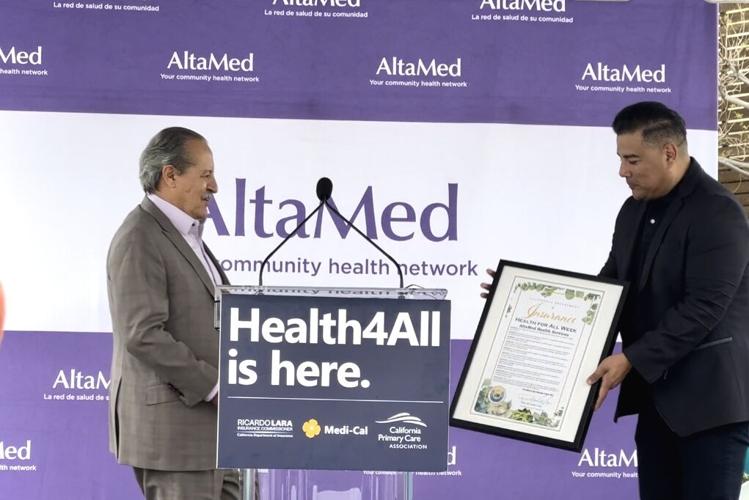
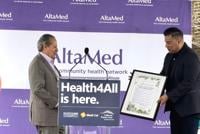
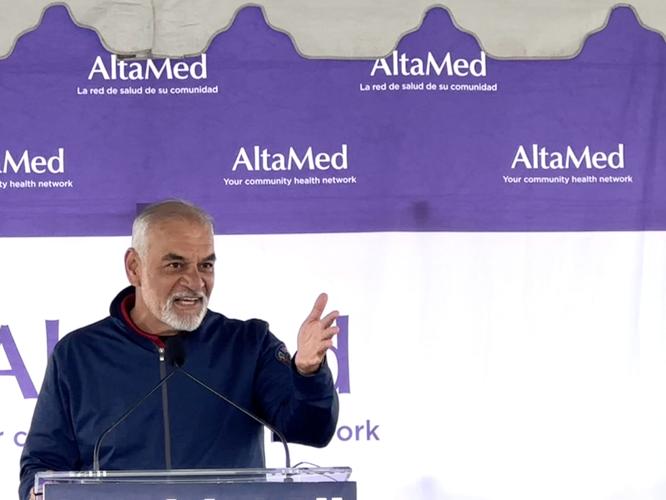
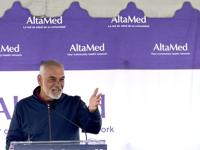

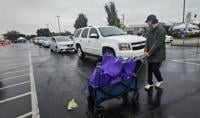






(0) comments
Welcome to the discussion.
Log In
Keep it Clean. Please avoid obscene, vulgar, lewd, racist or sexually-oriented language.
PLEASE TURN OFF YOUR CAPS LOCK.
Don't Threaten. Threats of harming another person will not be tolerated.
Be Truthful. Don't knowingly lie about anyone or anything.
Be Nice. No racism, sexism or any sort of -ism that is degrading to another person.
Be Proactive. Use the 'Report' link on each comment to let us know of abusive posts.
Share with Us. We'd love to hear eyewitness accounts, the history behind an article.